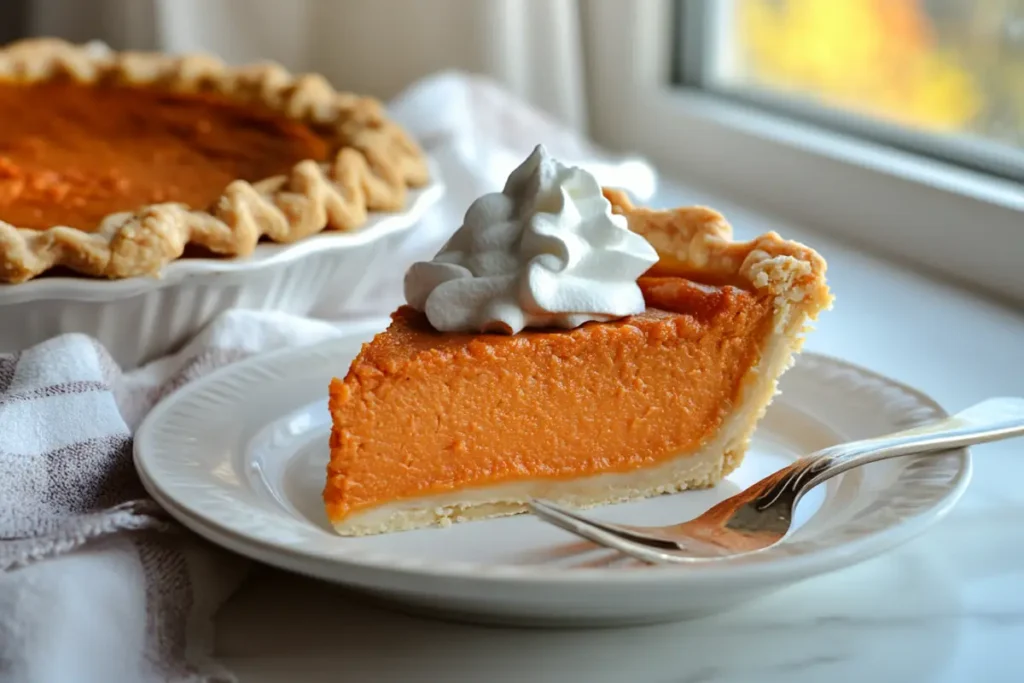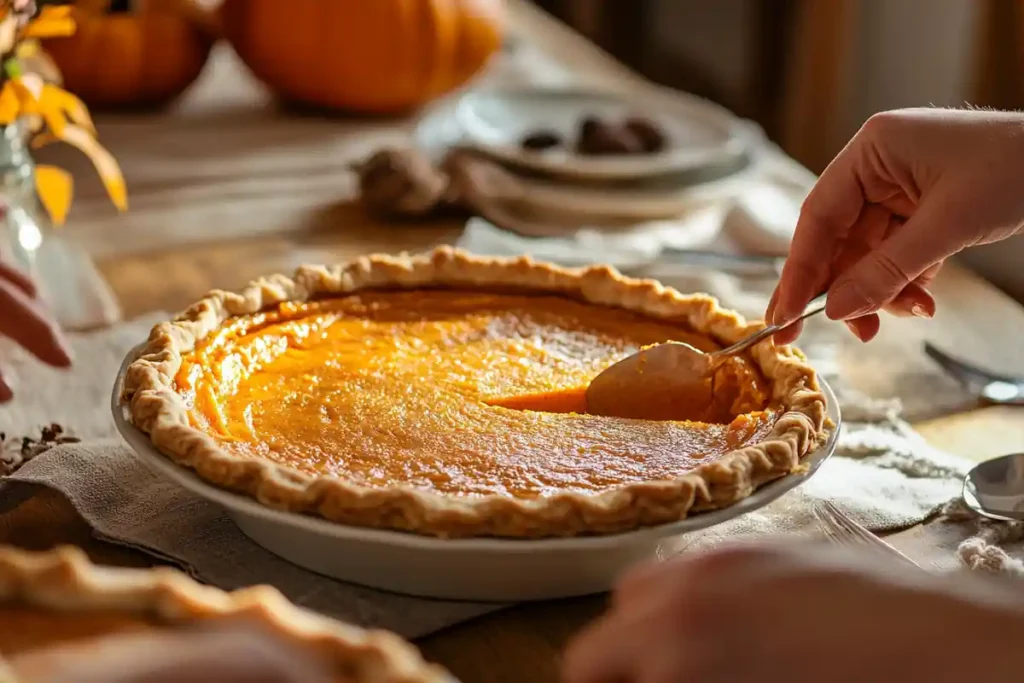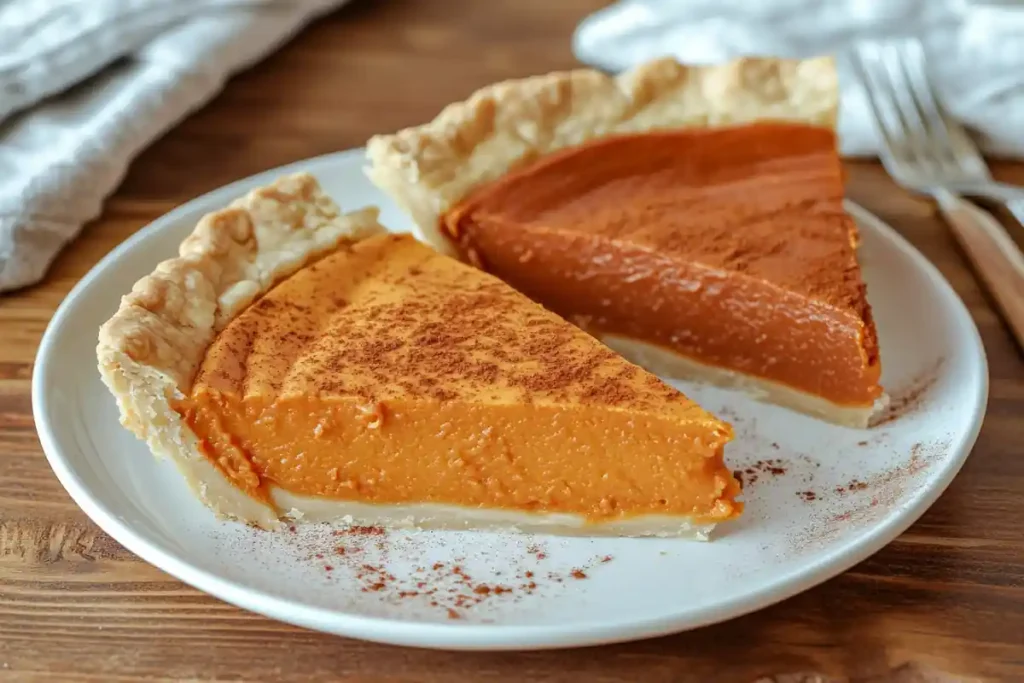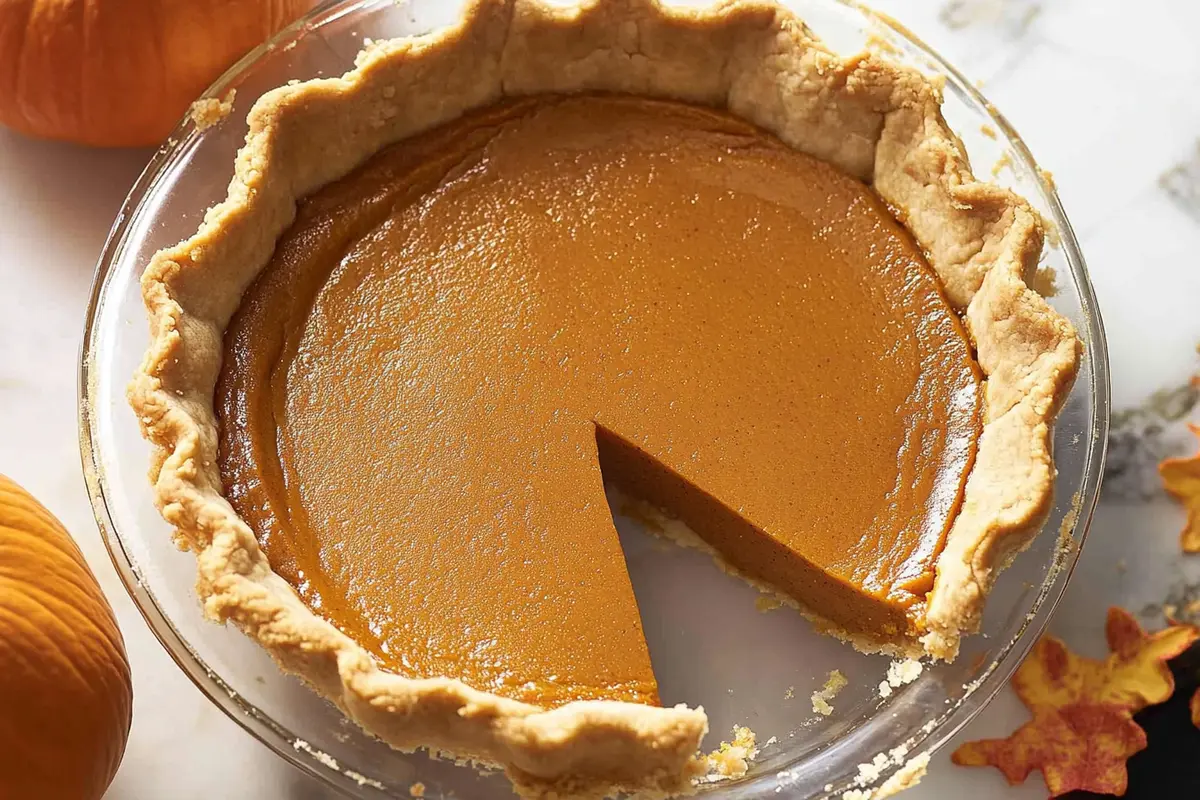Introduction and Historical Context: Do Black People Like Sweet Potato Pie or Pumpkin Pie?

The debate between sweet potato pie and pumpkin pie isn’t just about taste—it’s about cultural roots and family traditions, with key pumpkin and sweet potato differences, and deeply rooted traditions. These pies are more than just desserts; they represent histories shaped by migration, adaptation, and culinary creativity.
Historical Origins of Sweet Potato Pie: Do Black People Prefer Sweet Potato Pie?
The story of sweet potato pie begins in West Africa, where sweet potatoes were commonly grown and cooked in various forms. When enslaved Africans arrived in the Americas, they adapted this beloved tuber into a spiced, sweet dessert that mirrored the European settlers’ pumpkin pie. Over time, this transformation became a signature dish in African American culinary traditions, particularly in the South
Historical Origins of Pumpkin Pie: Is Pumpkin Pie Popular Among Black People?
Pumpkin pie has its roots in European colonization, evolving into a staple of American holiday tables, with traditional pumpkin pie ingredients. Native Americans introduced pumpkins to settlers, who turned the versatile squash into hearty pies. By the late 17th century, pumpkin pies appeared in cookbooks and became symbols of harvest celebrations. However, pumpkin pie never resonated in African American kitchens as strongly as sweet potato pie, possibly due to its association with European traditions.
Cultural Significance and Preferences

Sweet Potato Pie in African American Culture
Sweet potato pie holds a special place in African American celebrations and cultural heritage. From family reunions to Thanksgiving dinners, this dessert has become a symbol of warmth, love, and home-cooked comfort. Its rich, spiced filling wrapped in a flaky crust is as traditional as it is delicious.
The legacy of sweet potato pie stretches back generations, with recipes passed down through oral tradition and handwritten notes. Churches and community centers often serve this pie at social gatherings, reinforcing its connection to fellowship and shared history.
One of the figures often credited with promoting the sweet potato’s versatility was George Washington Carver, the agricultural scientist who advocated for the cultivation of sweet potatoes as a nutritious and sustainable crop. His work helped popularize sweet potato recipes, including the beloved pie, solidifying its place in African American kitchens.
Pumpkin Pie in Broader American Culture
Pumpkin pie is synonymous with Thanksgiving in the United States. It is often the star of holiday tables across the country, symbolizing abundance and the harvest season. Its creamy texture, warm spices like cinnamon and nutmeg, and iconic orange hue evoke a sense of nostalgia for many Americans.
Mainstream media has played a significant role in pumpkin pie’s popularity. From seasonal coffee drinks to holiday-themed commercials, pumpkin spice flavor dominates fall culture. While its historical roots tie back to early colonial America, pumpkin pie has evolved into a national symbol of autumnal celebration.
Regional Preferences and Influences
Regional differences influence whether sweet potato pie or pumpkin pie makes it to the holiday table in African American communities. In the Southern United States, where sweet potatoes are plentiful, sweet potato pie has long been preferred. Its availability and cultural resonance ensure it remains a staple in many homes.
In contrast, pumpkin pie enjoys greater popularity in regions where pumpkins are commonly grown, such as the Midwest and Northeast. Local agricultural practices and family traditions often determine which pie is favored, reflecting a deep culinary diversity across the country.
Culinary Comparisons and Modern Perspectives

Flavor Profiles and Ingredients
When it comes to taste and texture, sweet potato pie and pumpkin pie each bring something unique to the table. Sweet potato pie is known for its rich, dense, and naturally sweet filling. Its flavor is often deepened with warm spices like cinnamon, nutmeg, and vanilla. Traditional recipes call for mashed sweet potatoes, eggs, butter, sugar, and evaporated milk, creating a velvety, custard-like consistency.
Pumpkin pie, on the other hand, has a slightly lighter and spicier profile. It relies heavily on canned pumpkin puree, which offers a smooth, almost mousse-like texture. Its signature taste comes from an aromatic blend of spices such as ginger, cloves, and allspice. Both pies feature buttery, flaky crusts that complement their sweet fillings.
The subtle sweetness of sweet potatoes allows for less added sugar, while pumpkin requires more seasoning and sugar to enhance its mild flavor. This distinction often drives personal preferences, making each pie appealing in its own way.
Nutritional Comparisons
Nutritionally, both sweet potatoes and pumpkins are nutrient-dense but differ in specific health benefits. Sweet potatoes are higher in calories, carbohydrates, and dietary fiber, making them more filling and energizing. They are also rich in vitamins A and C, potassium, and beta-carotene, contributing to healthy skin and eyesight.
Pumpkins are lower in calories and carbohydrates, making them ideal for calorie-conscious eaters. They are also an excellent source of vitamin A and antioxidants, which support immune health. However, since both pies typically include sugar, butter, and crusts, their overall nutritional value depends on portion size and preparation methods.
Modern Trends and Adaptations
In today’s culinary world, sweet potato pie and pumpkin pie have been reimagined through creative recipes and trendy interpretations. Gourmet bakers now offer hybrid pies blending both fillings, while health-conscious chefs craft vegan and gluten-free versions.
Social media has amplified these modern twists. Influencers and food bloggers frequently share innovative pie recipes featuring unexpected ingredients like coconut milk, ginger snap crusts, or even savory elements like goat cheese.
Celebrity chefs have also played a pivotal role in redefining these classic pies. Figures like Carla Hall and Marcus Samuelsson have showcased sweet potato pie in upscale dining settings, while mainstream cooking shows highlight pumpkin-based desserts. Their creativity continues to keep these pies relevant and exciting for new generations.
Community Perspectives
Community Perspectives
The sweet potato vs. pumpkin pie debate often sparks passionate discussions within the Black community. While formal surveys are limited, anecdotal evidence and social media polls suggest a clear preference for sweet potato pie. For many African Americans, sweet potato pie is more than just a dessert—it’s a slice of home, tradition, and family history.
Stories shared during holiday gatherings often highlight how family recipes, passed down through generations, shape individual preferences. Many recount childhood memories of grandparents baking sweet potato pies from scratch, with the comforting aroma of cinnamon and nutmeg filling the kitchen.
Several cultural factors influence these choices. Geographic roots play a significant role, as sweet potato pie is deeply tied to the Southern culinary tradition where African American culture flourished post-slavery. Additionally, media representation also affects preferences—celebrity chefs and influencers frequently showcase sweet potato pie as a cultural staple, reinforcing its iconic status.
However, not everyone shares the same experience. Some younger African Americans raised in more diverse environments may enjoy pumpkin pie, often introduced through school events or multicultural holiday celebrations. In mixed families, both pies might coexist on the holiday table, symbolizing culinary inclusivity.
Frequently Asked Questions (FAQs)
Which is better, sweet potato pie or pumpkin pie?
It depends on personal preference. Sweet potato pie is richer and naturally sweeter, making it a favorite for those who enjoy a denser, more robust flavor. Pumpkin pie is lighter and spicier, appealing to those who prefer a mild, custard-like texture.
Do Black people prefer sweet potato pie?
Many African Americans traditionally prefer sweet potato pie due to its deep cultural roots in African American history and Southern cuisine. However, preferences vary based on personal taste, family traditions, and regional influences.
What is Black people’s favorite pie?
While preferences can differ, sweet potato pie is often considered a favorite in African American households, especially during the holidays. Its historical significance and cultural connections make it a popular choice at family gatherings and celebrations.
Do Africans eat sweet potatoes?
Yes, sweet potatoes are commonly eaten in many African countries. They are a nutritious, versatile staple in various traditional African dishes, often prepared boiled, mashed, or roasted, depending on the regional cuisine
What is the origin of sweet potato pie in African American culture?
Sweet potato pie traces its roots to West African culinary traditions. Enslaved Africans in the Americas adapted sweet potatoes into a spiced dessert, creating a signature dish that became a staple in African American culture, especially in the South.
How do sweet potato pie and pumpkin pie differ in taste?
Sweet potato pie has a naturally sweeter, richer taste with a denser texture, while pumpkin pie is lighter and spicier due to added spices like ginger and cloves. The differences in sweetness and spice levels define their unique flavor profiles.
Why is sweet potato pie more popular in African American households?
Sweet potato pie is closely tied to African American heritage and Southern culinary traditions. Its historical significance, cultural relevance, and family-centered recipes have made it a beloved dessert in African American homes.
Are sweet potatoes healthier than pumpkins?
Both are nutritious, but sweet potatoes have more fiber, potassium, and vitamins A and C, making them more filling and energy-boosting. Pumpkins are lower in calories and rich in vitamin A and antioxidants. The healthier option depends on dietary goals and how the pies are prepared.
Can pumpkin pie be substituted for sweet potato pie in recipes?
Yes, but the results will differ in taste and texture. Sweet potatoes have a denser, creamier consistency, while pumpkins produce a lighter, more custard-like filling. Adjust seasoning and sugar levels to balance the flavor.
How have modern chefs influenced the popularity of these pies?
Celebrity chefs and food influencers have revived traditional recipes and introduced modern variations, such as vegan, gluten-free, and fusion-style pies. Their influence has broadened the appeal of both desserts across diverse audiences.
Conclusion: Do Black People Like Sweet Potato Pie or Pumpkin Pie?
In the enduring debate between sweet potato pie and pumpkin pie, cultural heritage, family traditions, and personal experiences remain the strongest deciding factors. For many African Americans, sweet potato pie resonates as a symbol of resilience, creativity, and community, deeply woven into their cultural narrative.
While pumpkin pie is widely celebrated in mainstream American culture, sweet potato pie holds a special place in African American culinary traditions. Both pies reflect rich histories and cherished memories. Ultimately, choosing between them isn’t just about flavor—it’s about honoring heritage and preserving a legacy filled with warmth and tradition.

